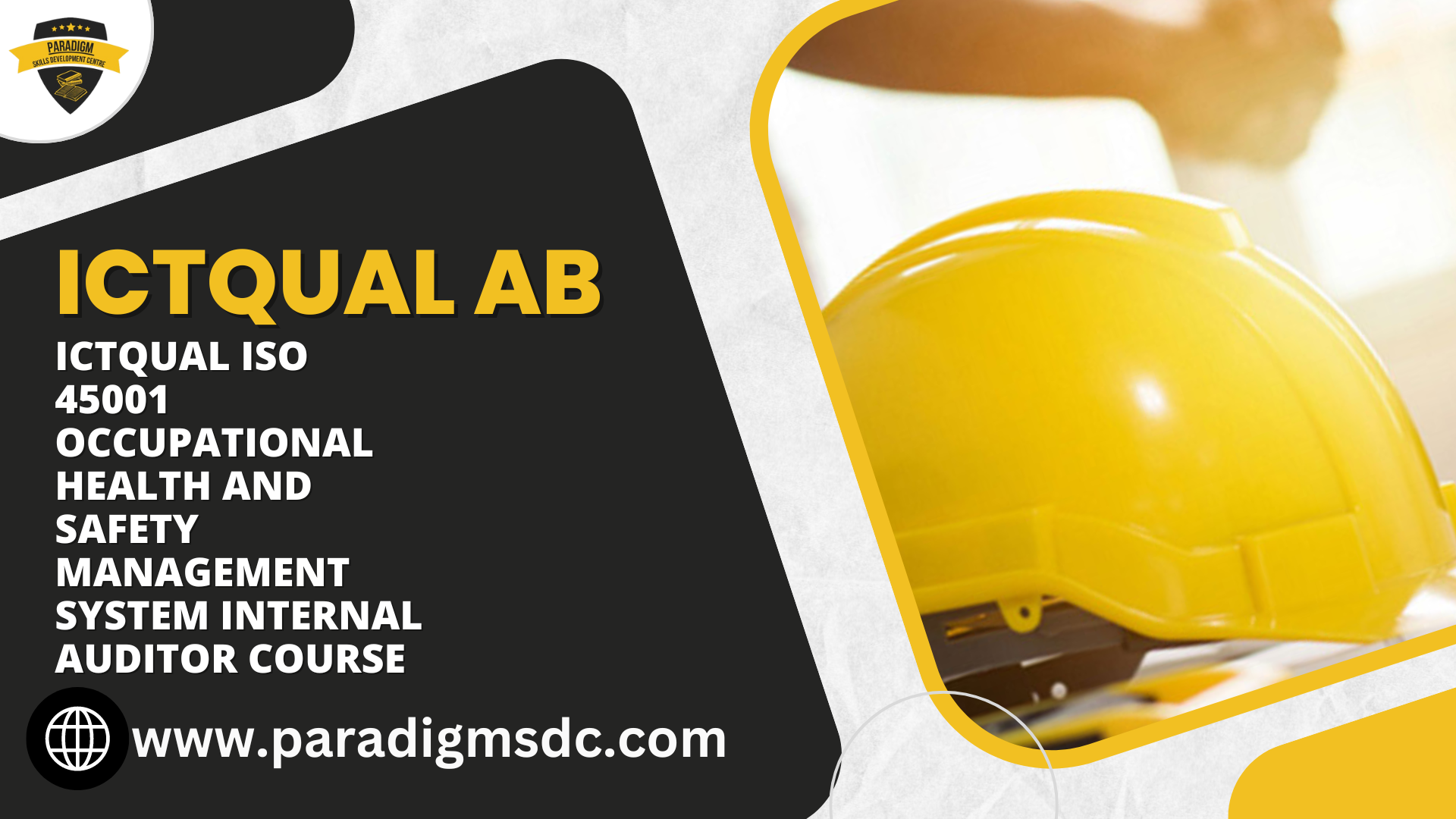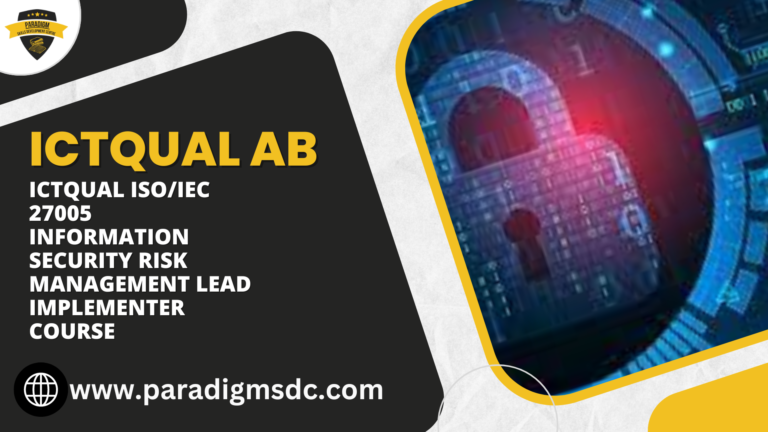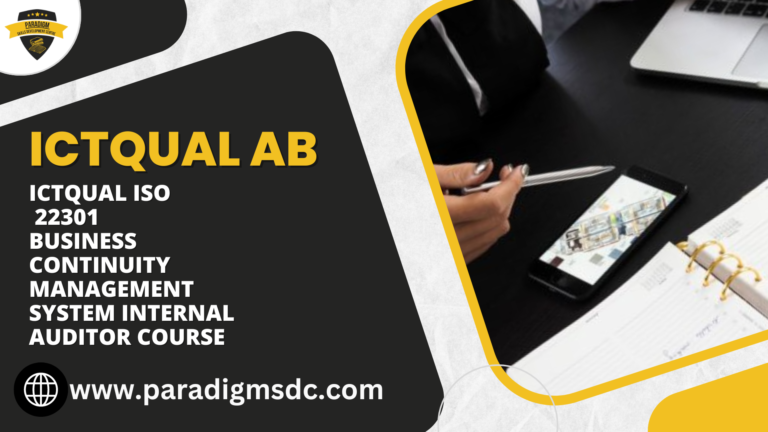Course Introduction
In today’s fast-paced business environment, ensuring the health and safety of employees is paramount. The ICTQual ISO 45001 Occupational Health and Safety Management System (OHSMS) Internal Auditor Course is designed to equip professionals with the essential skills and knowledge needed to conduct internal audits of an organization’s OHSMS. This course focuses on the ISO 45001 standard, which provides a framework for managing occupational health and safety risks and improving safety performance.
Course Overview
The ICTQual ISO 45001 Internal Auditor Course provides comprehensive training on the principles and practices of internal auditing for occupational health and safety management systems. It is tailored for individuals responsible for evaluating and improving the effectiveness of their organization’s OHSMS. The course covers the fundamental requirements of ISO 45001, the audit process, and the techniques required to assess compliance and effectiveness.
Course Study Units
- Introduction to ISO 45001 and Occupational Health and Safety Management Systems (OH&SMS)
- Fundamentals of Occupational Health and Safety Management
- Roles and Responsibilities of Internal Auditors
- Audit Planning and Preparation
- Conducting the Audit
- Documentation and Reporting
- Corrective Actions and Continual Improvement
- Regulatory Compliance and Emerging Trends
Learning Outcomes
By the end of the ICTQual ISO 45001 Internal Auditor Course, participants will be able to:
- Introduction to ISO 45001 and Occupational Health and Safety Management Systems (OH&SMS):
- Understand the purpose, scope, and structure of the ISO 45001 standard.
- Identify key components of occupational health and safety management systems (OH&SMS) and their role in promoting workplace safety.
- Recognize the importance of aligning organizational practices with ISO 45001 requirements for effective OH&S management.
- Fundamentals of Occupational Health and Safety Management:
- Grasp the principles of occupational health and safety, including hazard identification, risk assessment, and risk management.
- Identify common workplace hazards and understand methods for implementing control measures to mitigate risks.
- Understand the requirements of ISO 45001 and their application in managing occupational health and safety risks.
- Roles and Responsibilities of Internal Auditors:
- Define the role and significance of internal auditors in auditing OH&SMS.
- Understand the responsibilities, competencies, and ethical considerations associated with conducting internal audits.
- Develop effective communication and teamwork skills necessary for successful audit engagements.
- Audit Planning and Preparation:
- Develop comprehensive audit plans based on predefined objectives, scope, and criteria.
- Prepare audit checklists, schedules, and documentation to facilitate the audit process.
- Ensure adequate resource allocation and readiness for audit activities through thorough planning and preparation.
- Conducting the Audit:
- Apply appropriate auditing techniques and methods to gather evidence, conduct interviews, and assess compliance with OH&S management system requirements.
- Conduct opening and closing meetings with auditees and manage audit activities effectively to ensure objective and impartial audit outcomes.
- Uphold confidentiality and professionalism throughout the audit process.
- Documentation and Reporting:
- Document audit findings, observations, and conclusions accurately and comprehensively.
- Prepare clear and concise audit reports that effectively communicate audit findings, conclusions, and recommendations to relevant stakeholders.
- Ensure compliance with documentation requirements and standards during the reporting process.
- Corrective Actions and Continual Improvement:
- Identify nonconformities and opportunities for improvement through audit findings.
- Develop and implement corrective action plans to address identified issues and improve OH&S performance.
- Monitor the effectiveness of corrective actions and utilize audit findings to drive continual improvement in OH&S management systems.
- Regulatory Compliance and Emerging Trends:
- Understand regulatory requirements related to occupational health and safety and ensure organizational compliance.
- Stay informed about emerging trends, technologies, and best practices in occupational health and safety management.
- Identify strategies for adapting to evolving OH&S challenges and leveraging emerging trends to enhance workplace safety within organizations.
Course Benefits
- Enhanced Skills: Develop practical auditing skills that are directly applicable to your organization’s health and safety management system.
- Compliance Assurance: Ensure that your organization meets the ISO 45001 requirements and improves overall safety performance.
- Career Advancement: Gain a valuable qualification that enhances your professional credentials and opens up opportunities for career advancement in occupational health and safety.
- Risk Reduction: Improve your organization’s ability to identify and manage health and safety risks, leading to a safer working environment.
Who Is This Course For?
This course is ideal for:
- Internal Auditors: Professionals who are responsible for auditing their organization’s OHSMS.
- Health and Safety Managers: Individuals involved in managing and improving occupational health and safety practices.
- Compliance Officers: Those tasked with ensuring adherence to safety regulations and standards.
- Quality Assurance Professionals: Experts seeking to expand their knowledge in health and safety management systems.
- Safety Consultants: Consultants who need to understand ISO 45001 for providing expert advice to clients.
Future Progression
Upon completing the ICTQual ISO 45001 Internal Auditor Course, participants may pursue further qualifications to advance their careers, such as:
- Lead Auditor Training: Progress to an ISO 45001 Lead Auditor course to conduct external audits and lead audit teams.
- Advanced Safety Management Courses: Enroll in advanced courses focused on specific aspects of occupational health and safety.
- Specialized Certifications: Obtain certifications in related fields, such as environmental management (ISO 14001) or quality management (ISO 9001).
The ICTQual ISO 45001 Occupational Health and Safety Management System Internal Auditor Course offers a strong foundation for professionals seeking to enhance their skills in internal auditing and contribute to the improvement of occupational health and safety within their organizations.







